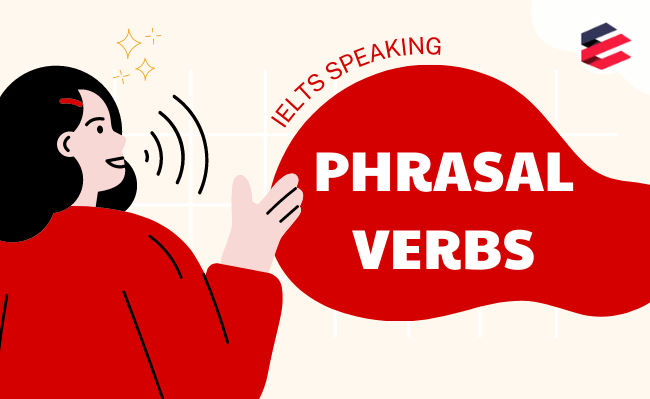Unlocking Expression: The Significance of Phrasal Verbs for IELTS Speaking
Among the linguistic elements, phrasal verbs stand as dynamic tools that unlock doors to richer and more authentic language usage. As candidates embark on the journey of mastering the International English Language Testing System (IELTS), the strategic incorporation of phrasal verbs emerges as a potent technique to elevate their language proficiency and enhance their performance in both the speaking and writing components of the test. In this article, we are going to introduce the impact of phrasal verbs for IELTS.

1. What is a phrasal verb?
A phrasal verb is a combination of a verb and one or more particles (typically prepositions or adverbs) that function as a single unit to convey a specific meaning. The meaning of a phrasal verb often cannot be deduced from the meanings of its individual parts. Phrasal verbs are commonly used in English and play a significant role in both spoken and written communication.
The particle in a phrasal verb can change the verb’s meaning or add a particular sense to it. Phrasal verbs are used in various contexts to express actions, processes, relationships, and more. They are an integral part of idiomatic language and contribute to the richness and flexibility of English expression.
For example, consider the phrasal verb “give up.” In this case, “give” is the verb, and “up” is the particle. “Give up” means to stop doing something or to quit, and the meaning of the phrase cannot be inferred by looking at the individual meanings of “give” and “up.”
Phrasal verbs come in various forms, including transitive (requiring a direct object) and intransitive (not requiring a direct object) phrasal verbs. Learning and mastering phrasal verbs can greatly enhance one’s language skills, allowing for more nuanced and expressive communication.
>>See also: Idiom for IELTS Speaking
2. Using phrasal verbs in IELTS Speaking
2.1. Advantages
Using phrasal verbs effectively in your IELTS speaking can enhance your language proficiency and make your responses more engaging and authentic.
Enhanced Vocabulary Range: Incorporating phrasal verbs into your responses demonstrates a wider vocabulary range. It showcases your ability to use language creatively and effectively, which can impress examiners and elevate your language score.
Natural and Fluent Communication: Phrasal verbs are an integral part of everyday English, and using them appropriately makes your speech and writing sound more natural and fluent. This can contribute positively to your fluency score in the IELTS speaking test.
Effective Expression of Ideas: Phrasal verbs often convey nuances and shades of meaning that single-word verbs might not capture. By using phrasal verbs, you can express your ideas more precisely, leading to clearer and more effective communication.
Idiomatic Language Usage: Phrasal verbs are idiomatic expressions that reflect the language’s natural flow. Incorporating them adds authenticity to your language usage and can help you achieve a higher score in the IELTS test’s “lexical resource” criterion.
Engaging and Memorable Responses: Examiners are likely to remember candidates who use phrasal verbs creatively. Engaging responses that incorporate idiomatic expressions can leave a lasting impression, potentially influencing your speaking and writing scores.
Cultural Awareness: Many phrasal verbs are deeply rooted in culture and context. Using them appropriately shows that you not only understand their meanings but also the cultural nuances associated with them.
Versatility in Different Topics: Phrasal verbs can be used across various topics, adding depth to your responses. This versatility can be advantageous in both the speaking and writing tasks of the IELTS exam.
Language Flexibility: Employing phrasal verbs demonstrates your ability to adapt your language to different contexts. This is crucial for the “coherence and cohesion” criterion, as it contributes to the overall organization of your ideas.
Personal Style: The use of phrasal verbs can reflect your personal style and voice in your responses. This can make your communication more interesting and unique.
Higher Scoring Potential: When used correctly and contextually, phrasal verbs can contribute positively to multiple scoring criteria, including vocabulary range, fluency, lexical resource, and coherence.
2.2. Disadvantages
While using phrasal verbs in your IELTS speaking can offer numerous advantages, there are also potential disadvantages that you should be aware of. Here are some drawbacks to consider:
Misuse and Inaccuracy: Incorrect usage of phrasal verbs can lead to confusion and convey unintended meanings. If you use a phrasal verb incorrectly, it might negatively impact the clarity and coherence of your response.
Formality Concerns: Some phrasal verbs are more informal in nature, and their usage might not be suitable for all IELTS contexts. Overusing informal phrasal verbs in formal writing tasks, for instance, can affect the appropriate tone.
Cultural Nuances: Phrasal verbs can carry cultural connotations that might not translate well across different English-speaking regions. Using culturally-specific idiomatic expressions might confuse examiners or result in miscommunication.
Overuse: While phrasal verbs can enrich your language, excessive use can make your speech or writing sound overly contrived or repetitive. Strive for a balanced mixture of single-word verbs and phrasal verbs.
Contextual Fit: Not all phrasal verbs fit all contexts. Using them indiscriminately without considering whether they accurately convey your intended meaning can lead to incongruent language usage.
Examiner Understanding: Examiners might not always be familiar with all idiomatic expressions, especially those that are less common. Using highly specialized or obscure phrasal verbs could result in confusion.
Time Constraints: In the IELTS speaking test, there’s a limited amount of time for each response. Over-reliance on phrasal verbs might slow down your speech and impede your ability to convey your ideas within the allocated time.
Pressure and Nervousness: Using phrasal verbs under exam conditions, especially if you’re not entirely comfortable with them, could lead to nervousness or errors that affect your overall performance.
Comprehensibility: The primary goal of your IELTS responses is to be easily understood by examiners. If your use of phrasal verbs hinders comprehension, it can impact your communication and score.
Lack of Relevance: Sometimes, candidates might force the use of phrasal verbs into their responses even when they are not entirely relevant. This can come across as unnatural or forced.

3. Common phrasal verbs for IELTS Speaking
Here are some common phrasal verbs that can be useful for your IELTS Speaking test:
3.1. Talk About
- Talk about
- Speak about
- Discuss
- Go over
- Touch on
- Cover
3.2. Give Up
- Give up
- Quit
- Abandon
- Stop
- Surrender
3.3. Take Care of
- Take care of
- Look after
- Care for
- Attend to
3.4. Get Along With
- Get along with
- Have a good relationship with
- Have a rapport with
- Be on good terms with
3.5. Look Forward To
- Look forward to
- Anticipate
- Eagerly await
3.6. Put Off
- Put off
- Postpone
- Delay
3.7. Bring Up
- Bring up
- Mention
- Raise
3.8. Turn Out
- Turn out
- End up
- Result in
- Eventually be
3.9. Run Out Of
- Run out of
- Exhaust
- Use up
3.10. Come Across
- Come across
- Encounter
- Run into
3.11. Put Up With
- Put up with
- Tolerate
- Bear
3.12. Look Up To
- Look up to
- Admire
- Respect
3.13. Stand Out
- Stand out
- Be noticeable
- Distinguish oneself
3.14. Look Into
- Look into
- Investigate
- Examine
3.15. Set Up
- Set up
- Establish
- Arrange
3.16. Call Off
- Call off
- Cancel
- Abandon
3.17. Take Advantage of
- Take advantage of
- Exploit
- Utilize
3.18. Run Into
- Run into
- Encounter
- Meet unexpectedly
3.19. Make Up
- Make up
- Invent
- Fabricate
3.20. Look Out For
- Look out for
- Watch for
- Be vigilant for

4. Example of using phrasal verbs in IELTS Speaking
4.1. Talk About
“I’d like to talk about a memorable trip I took last year to Paris.”
“Let’s discuss the advantages and disadvantages of using public transportation.”
4.2. Give Up
“I used to struggle with mathematics, but I didn’t give up and kept practicing until I improved.”
“I’m determined to give up smoking to improve my health.”
4.3. Take Care of
“As the eldest sibling, I often have to take care of my younger brother after school.”
“It’s important to take care of our environment by reducing waste and recycling.”
4.4. Get Along With
“I get along very well with my colleagues at work, which creates a positive atmosphere.”
“In a multicultural society, it’s essential to get along with people from diverse backgrounds.”
4.5. Look Forward To
“I’m really looking forward to traveling abroad and experiencing new cultures.”
“I’m looking forward to the weekend so I can relax and spend time with my family.”
4.6. Put Off
“I had to put off the meeting until next week due to scheduling conflicts.”
“Procrastination often leads to putting off important tasks until the last minute.”
4.7. Bring Up
“I’d like to bring up the topic of climate change and its impact on our lives.”
“During the interview, the candidate brought up their experience working with international teams.”
4.8. Turn Out
“The event turned out to be a huge success, with a larger turnout than expected.”
“Although I was initially worried, everything turned out fine in the end.”
4.9. Run Out Of
“I forgot to buy groceries, and now I’ve run out of milk for my cereal.”
“We need to be careful not to run out of time during the exam.”
4.10. Come Across
“While reading a book, I came across an interesting quote about perseverance.”
“During my travels, I came across a hidden gem of a restaurant with amazing local cuisine.”
In the intricate journey of mastering the IELTS Speaking test, the strategic incorporation of phrasal verbs emerges as a valuable tool that transcends the boundaries of language proficiency. Phrasal verbs, those dynamic combinations of verbs and particles, weave a tapestry of nuanced expression that resonates deeply with examiners and elevates candidates’ responses to new dimensions. In order to be a master on IELTS Test, do our IELTS practice test now!